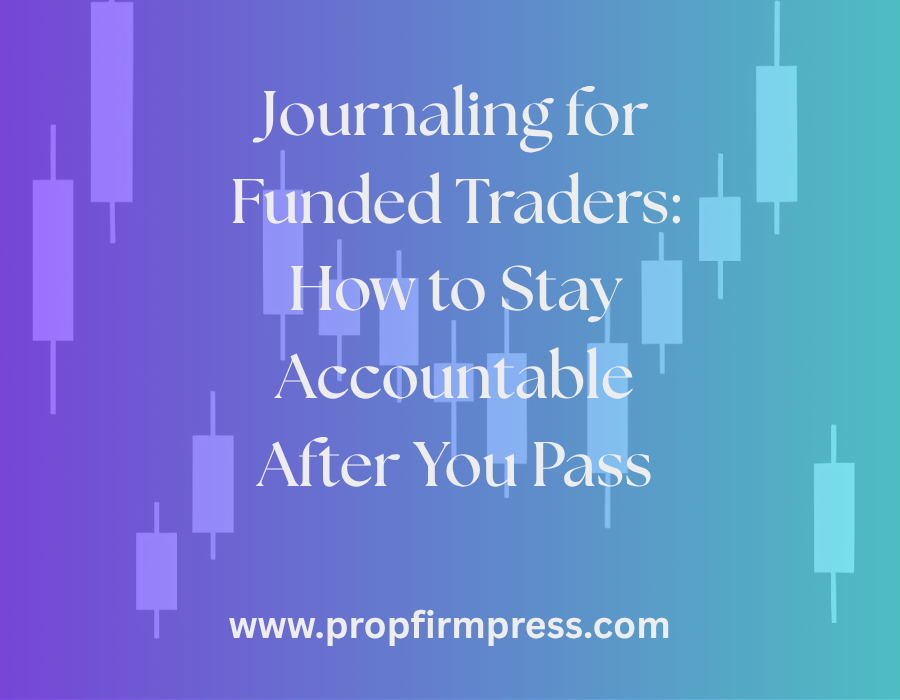Journaling for Funded Traders: How to Stay Accountable After You Pass
Passing a prop firm challenge is a milestone worth celebrating—but it’s not the end of the journey. For many traders, the real test begins after they get funded. With more capital at stake and tighter risk parameters, discipline becomes more important than ever. That’s where journaling comes in. A structured journal keeps you grounded, objective, and accountable long after the challenge phase is over.
Why Funded Traders Need Journaling Even More
Many traders let their journaling habit slide after reaching the funded stage. But this is a critical mistake. The accountability, structure, and performance tracking you relied on during the evaluation become even more essential once you’re live.
At this stage, mistakes are more expensive. Prop firms like Instant Funding or Lucid Trading don’t give second chances easily. A careless violation can mean a revoked account. Your journal is what keeps those mistakes visible—and avoidable.
Track More Than Just PnL
When you’re funded, it’s tempting to focus solely on profit. But if you only track wins and losses, you miss the behaviors that actually determine performance. Your journal should include:
- Daily rule compliance (Did you exceed max loss? Trade outside hours?)
- Trade setups taken and why
- Execution quality (late entries, hesitations, exits too early)
- Emotional state and confidence levels
- Size management and scaling strategy
Use a structured template like the Prop Firm Press Journal Sheets to stay consistent and thorough.
Monitor Rule Adherence Closely
Every prop firm has its own rulebook—and they enforce it. Journals help you double-check your behavior against these rules. Ask yourself after each day:
- Did I respect the trailing drawdown?
- Was my daily loss within limits?
- Did I overtrade beyond my permitted trades?
If your funded account has a trailing drawdown like with Funded Futures Network, one bad day could wipe you out. Journaling these metrics forces awareness and control.
Use Weekly Reviews to Stay Honest
End-of-week reviews are critical for funded traders. Take time every weekend to review your journal and ask:
- What patterns worked?
- Where did I break rules or hesitate?
- How can I improve emotionally next week?
Don’t rely on memory. Let your notes show you the truth, so you can course correct fast.
Create Accountability Goals
Your journal can also be a goal-setting tool. Each week, create 1–2 accountability targets such as:
- “No more than 3 trades per day”
- “Respect 1% max loss on all trades”
- “Take screenshots of every entry and exit”
Write these in your journal. At the end of the week, assess whether you stuck to them. This builds self-discipline over time.
Log Emotions Honestly
As a funded trader, emotions run high. Fear of losing the account. Pressure to grow it fast. Journal your emotional state before and after each session. Were you nervous? Overconfident? Anxious? This gives you the data you need to manage mindset proactively.
You might discover that certain setups only work when you’re calm—or that you tend to violate rules on high-news days. Emotions have patterns too.
Use Visuals to Stay Sharp
Include screenshots with every trade log. Visuals help reinforce what setups looked like and whether execution matched the plan. Over time, you’ll build a picture-based playbook of your best trades—making future decisions faster and more confident.
Measure Performance, Not Just Profits
Track:
- Risk-to-reward on average
- Drawdown size
- Setup accuracy
- Daily profit consistency
This gives you a complete picture of your performance. You may be profitable but taking on too much risk. Or you may be losing but executing well and just in a cold streak. The journal helps separate good process from random results.
Stay Connected to Your Why
It’s easy to become mechanical once you’re funded. Journaling helps you remember why you’re doing this. You’re building a business. You’re managing capital. You’re becoming a professional. Each journal entry is a step toward that identity.
Even just rereading your own notes from the challenge phase can reignite the fire that got you funded in the first place.
The Secret Weapon for Staying Funded
Journaling is your secret weapon for post-challenge success. It keeps you focused, disciplined, and improving long after you’ve reached your goal. The traders who stay funded for years aren’t the ones with the best indicators—they’re the ones who review, reflect, and refine. Make your journal your accountability partner, and you’ll keep your seat at the funded table.
